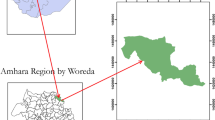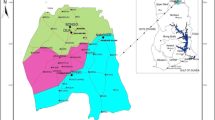Abstract
The aim of this study was to examine the level of awareness of Niger Delta communities about impacts of climate change and to identify and document indigenous innovations and practices for adaptation to climate change by farmers in the region. Three states were randomly selected from the nine states that make up the Niger Delta. Multistage sampling technique was used to interview 400 heads of farming households in Cross Rivers, Delta and Rivers States. Analysis of the data utilized simple descriptive statistics, while the results were presented as tables, figures and charts. Two single sex Focus Group Discussions (FGDs) were conducted in each of the survey states giving a total of six FGDs. Data from the FGDs complemented the survey results. Findings of this study showed that about 90 % of respondents were aware of climate change and its impacts. The results further indicate that the farmers have practiced some innovative indigenous measures for climate change adaptation for many years. It was also noted that the identified indigenous adaptive strategies which have Science, Technology and Innovation policy relevance could inform the design and implementation of future Agricultural, Development and Climate Change Policy in the region. Lastly, policy recommendations are made to improve climate change awareness and adaptation to climate change impacts in the Niger Delta region of Nigeria.



Similar content being viewed by others
Notes
Aladimma refers to a community forum that sees that there is order in the land. Aladimma is for this reason the highest political, governance and social forum for every Igbo community, where important decisions are taken. It comprises all adult males and sometimes females of the native community and is led by the elders drawn from the heads of the family units, who act as official representatives of their family groups. For a more detailed examination of the role of the Aladimma Institution in natural resources management and conflict resolution, traditional environmental governance and justice dispensation in Igboland, see Njoku 2008; Uwah 2011).
References
Akinro, A. O., Opeyemi, D. A., & Ologunagba, I. B. (2008). Climate change and environmental degradation in the Niger Delta region of Nigeria; Its vulnerability, impacts and possible mitigations. Research Journal of Applied Sciences, 3(3), 167–173.
Apata, T. G., Samuel, K. D, & Adeola, A. O. (2009). Analysis of climate change perception and adaptation among arable food crop farmers in South Western Nigeria. In Contributed paper prepared for presentation at the international association of agricultural economists’ 2009 conference, Beijing, China, August 16–22, 2009.
Dung, E. J., Bombom, L. S., & Agusomu, T. A. (2008). The effects of gas flaring on crops in the Niger Delta, Nigeria. GeoJournal, 73, 297–305. doi:10.1007/s10708-008-9207-z.
Edino, M. O, Nsofor, G. N, & Bombom, L. S. (2010). Perceptions and attitudes towards gas flaring in the Niger Delta, Nigeria. Environmentalist, 30(1). doi:10.1007/s10669-009-9244-2.
Federal Republic of Nigeria. (2004). Niger Delta regional development master plan. Abuja: NDDC.
Fischer, G., Shah, M., Tubiello, F. N., & Van Velhuizen, H. (2005). Socio-economic and climate change impacts on agriculture: An integrated assessment, 1990–2080. Phil. Trans. R. Soc. B, 360, 2067–2083. doi:10.1098/rstb.2005.1744.
Ibeanu, O., Oruwari, Y., & Egom, P. A. (2007). Abia State. In L. A. Jinadu, B. A. Chokor, O. Ibeanu, Y. Oruwari, P. A. Egom, M. Abutudu, V. A. Isumonah, S. Joab-Peterside, N. Toyo, D. Garuba, T. Bolton, & U. Ukiwo (Eds.), Democracy, oil and politics in the Niger Delta: Linking citizens’ perceptions and policy reform (pp. 49–93). Port Harcourt: Centre for Advanced Social Science.
Ifeanyi-Obi, C. C., Etuk, U. R., & Jike-wai, O. (2012). Climate change, effects and adaptation strategies: Implication for agricultural extension system in Nigeria. Greener Journal of Agricultural Sciences, 2(2), 53–60.
Intergovernmental Panel on Climate Change (IPCC). (2007). Summary for policymakers. In M. L. Parry, O. F. Canziani, J. P. Palutikof, P. J. van der Linden, & C. E. Hanson (Eds.), Climate change 2007: Impacts, adaptation and vulnerability. Contribution of working group II to the fourth assessment report of the intergovernmental panel on climate change (pp. 7–22). Cambridge, UK: Cambridge University Press.
Ishaya, S., & Abaje, I. B. (2008). Indigenous people’s perception on climate change and adaptation strategies in Jema’a local government area of Kaduna State, Nigeria. Journal of Geography and Regional Planning, 1(8), 138–143.
National Population Commission of Nigeria. (2009). 2006 Population and housing census of the Federal Republic of Nigeria: National and State Population and Housing Tables: Priority tables (vol. 1). Abuja: NPC.
Nigerian Communications Commission. (2011). Subscriber data. http://www.ncc.gov.ng/industry-statistics/subscriber-data.html. Accessed on 09:10:11.
Njoku, C. U. (2008). Aladimma institution: A legal social power in Igbo philosophy: An amumara perspective. Journal of Nigerian Languages and Culture, 10(1). Retrieved from http://www.apnilacnigeria.org/vol10-01-2008.html.
Nnamchi, H. C., & Ozor, N. O. (2009). Climate change and the uncertainties facing farming communities in the middle belt region of West Africa. Paper presented at the 7th International Science Conference on the Human Dimensions of Global Environmental Change (IHDP Open Meeting 2009) held at the United Nations University, Bonn, Germany between 26 April and 1 May, 2009. Retrieved from http://www.openmeeting2009.org/pdf_files/Pdf%20papers/Nnamchi_Ozor.pdf.
Nzeadibe, T. C., & Ajaero, C. K. (2010). Assessment of socio-economic characteristics and quality of life expectations in rural communities of Enugu State, Nigeria. Applied Research in Quality of Life, 5(4), 353–371.
Nzeadibe, T. C., Egbule, C. L., Chukwuone, N. A., & Agu, V. C. (2011a). Climate change awareness and adaptation in the Niger Delta Region of Nigeria. African Technology Policy Studies Network (ATPS) Working Paper No. 57. Nairobi: ATPS. Available at www.atpsnet.org/Files/wps57.pdf.
Nzeadibe, T. C., Egbule, C. L., Chukwuone, N. A., & Agu, V. C. (2011b). Farmers’ perception of climate change governance and adaptation constraints in the Niger Delta Region of Nigeria. African Technology Policy Studies Network (ATPS) Research Paper Series No. 7. Nairobi: ATPS. Available at http://www.atpsnet.org/Files/rps7.pdf.
Nzeadibe, T. C., Egbule, C. L., Chukwuone, N. A., & Agu, V. C. (2011c). What policy options can promote climate change awareness and adaptation in Niger Delta Region of Nigeria? African Technology Policy Studies Network (ATPS) Technopolicy Brief No. 28. Available at http://www.atpsnet.org/Files/pb28.pdf.
Olujimi, J. (2007). Climate change and coastal settlement planning in Nigeria: A call for capacity building. Bulletin of Science Association of Nigeria, 28, 28–31.
Oruwari, Y. (2001). New generation churches and the provision of welfare: A gender study from Port Harcourt, Nigeria. In A. Tostensen, I. Tvedten, & M. Vaa (Eds.), Associational life in African cities: Popular responses to the urban crisis (pp. 77–89). Uppsala: Nordiska Afrikainstitutet.
Ozor, N. (2010). Influencing curriculum development and knowledge of climate change issues at the University of Nigeria Nsukka and Environs. Final technical report submitted to the global change Systems for Analysis, Research and Training (START) under the African Climate Change Fellowship Programme (ACCFP).
Pachauri, R. K. (2009). State of climate science: Enabling enlightened policies. Paper Presented at the International Scientific Congress, Copenhagen 10th March 2009.
Robinson, J. B., & Herbert, D. (2001). Integrating climate change and sustainable development. International Journal of Global Environmental Issues, 1(2), 130–149.
Speranza, C. I. (2010). Resilient adaptation to climate change in African agriculture. Bonn: German Development Institute (DIE).
Ugochukwu, C. N. C., Ertel, J., & Schmidt, M. (2008). Environmental sustainability and sustainable development issues in the Niger Delta region of Nigeria. Forum der Forschung, 21(2008), 151–156.
UNDP/World Bank. (2004). Strategic Gas Plan for Nigeria, Joint UNDP/World Bank Energy Sector Management Assistance Programme (ESMAP).
Uwah, I. E. (2011). The representation of African Traditional Religion and culture in Nigeria popular films. Politics and Religion, 5(1), 81–102.
Uyigue, E., & Agho, M. (2007). Coping with climate change and environmental degradation in the Niger Delta of Southern Nigeria. Benin City: Community Research and Development Centre. Available at http://www.credcentre.org/Publications/adaptation_nigerdelta.pdf.
World Bank. (1995). Defining an environmental development strategy for the Niger Delta. Washington, DC: World Bank.
World Bank. (2008). World development report 2008: Agriculture for development. Washington, DC: World Bank.
Acknowledgments
The authors gratefully acknowledge the comments of two anonymous reviewers which have improved the content and presentation of the paper. This paper was produced as part of the implementation of the African Technology Policy Studies Network (ATPS) Phase VI Strategic Plan, 2008–2012 funded by ATPS Donors including the Ministerie van Buitenlandse Zaken (DGIS) the Netherlands, Rockefeller Foundation, among others. The authors hereby thank the ATPS for the financial and technical support during the implementation of the program. The Authors specially thank the ATPS Climate Sense Program Director, Prof. Kevin Urama (ATPS); and the Program Coordinators including Prof. Francis Mutua (ATPS Kenya); Prof. George Essegbgey (ATPS Ghana); Prof. Eric Eboh (ATPS Nigeria); Dr. Nicholas Ozor (ATPS); and Ms. Wairimu Mwangi (ATPS) for their technical support during the research process. This paper was presented at the first Climate Change and Development in Africa (CCDA-1) Conference, 17-19 October 2011 at Addis Ababa, Ethiopia. Support of the African Climate Policy Centre (ACPC) toward participation at the event is also acknowledged.
Author information
Authors and Affiliations
Corresponding author
Rights and permissions
About this article
Cite this article
Nzeadibe, T.C., Egbule, C.L., Chukwuone, N.A. et al. Indigenous innovations for climate change adaptation in the Niger Delta region of Nigeria. Environ Dev Sustain 14, 901–914 (2012). https://doi.org/10.1007/s10668-012-9359-3
Received:
Accepted:
Published:
Issue Date:
DOI: https://doi.org/10.1007/s10668-012-9359-3




